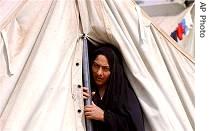2007年VOA标准英语-Number of Internally Displaced in Iraq Increasi(在线收听)
Geneva
16 February 2007
The Geneva-based International Organization for Migration reports that over the past three weeks alone almost 18,000 people have been displaced in Iraq, and it expects the number to grow much higher as the year goes on. Lisa Schlein reports for VOA from Geneva.
 |
| An Iraqi woman at a camp in Diwaniyah, 130 kilometers south of Baghdad |
"It is very worrying, not least because there are fewer and fewer communities within Iraq [that] are able to absorb and assist the newly displaced," she said. "Some of the more stable governorates, which are facing an increasing burden on their social infrastructures are now either restricting entrance or not allowing newly displaced to come there."
Pandya says it is getting very hard for people to find places of refuge inside Iraq and even those who succeed are having great difficulty surviving.
Out of a population of around 26 million people, about 1.5 million Iraqis are internally displaced persons. Most were displaced before the 2003 war, due to three decades of conflict, sanctions and the policies of Saddam Hussein's regime.
IOM says emergency supplies such as shelter and food are urgently needed. Many of the displaced are renting space in dilapidated buildings or are building makeshift houses that often lack electricity, insulation or sanitation and kitchen facilities.
Pandya says IOM has received reports that many displaced children are forced to work or beg to support their families. Some are getting violent.
"In one governorate, Dyala, it has been reported to IOM that children between 10 and 14 have joined local insurgents, partly as a way of getting money or partly as revenge action to acts that have been committed on family members," she said.
Pandya says malnutrition, disease and infections are growing among children because of a lack of food and the deterioration of health services, including the exodus of many health care professionals from Iraq.
IOM says it needs $50 million for its assistance programs this year. It says the response to its appeal so far has been very poor.